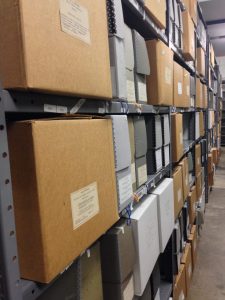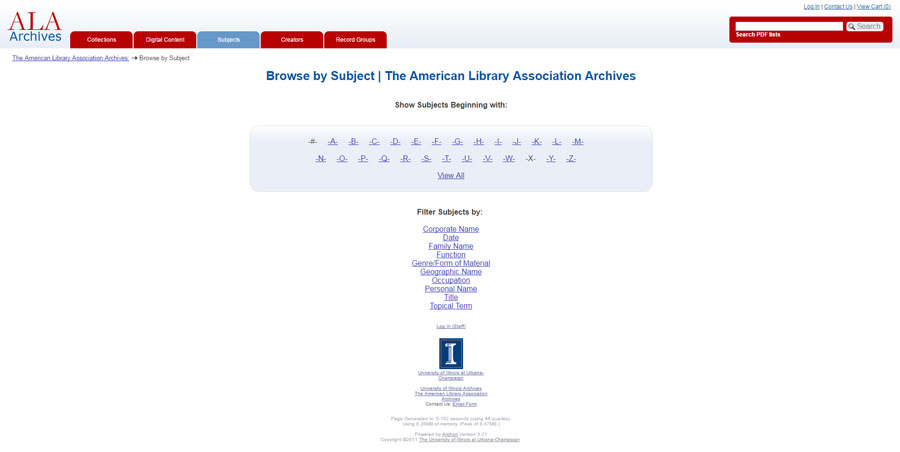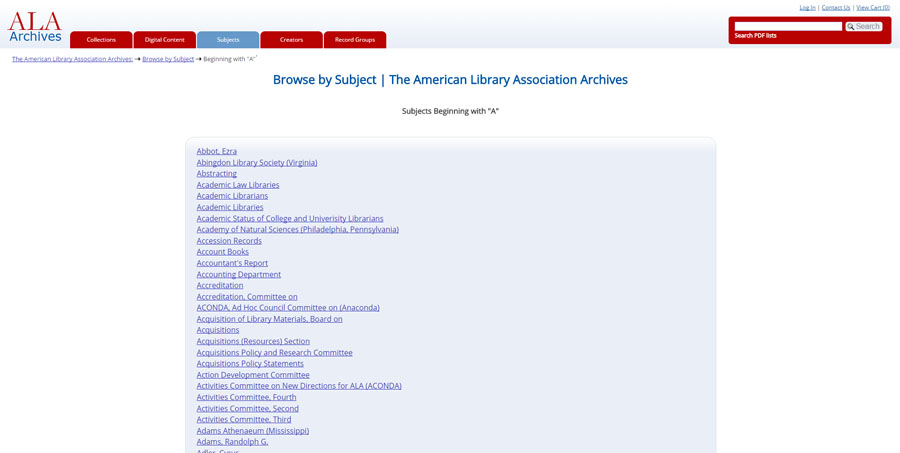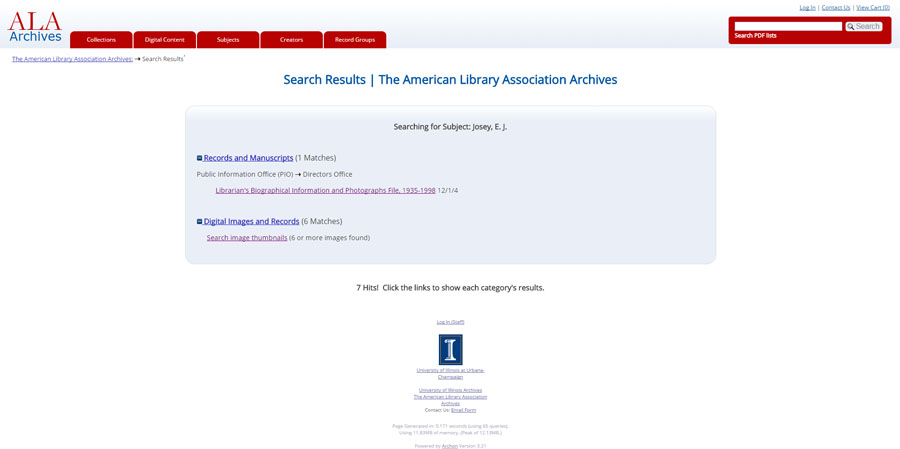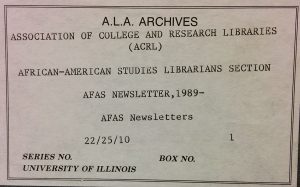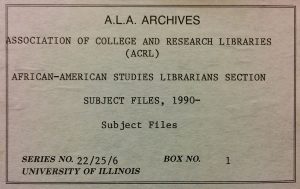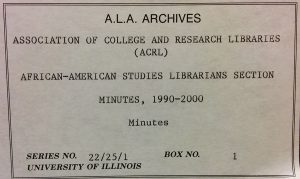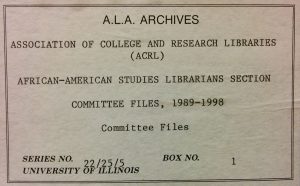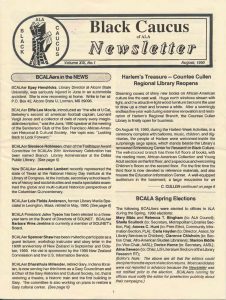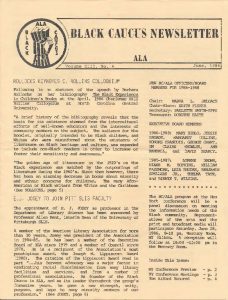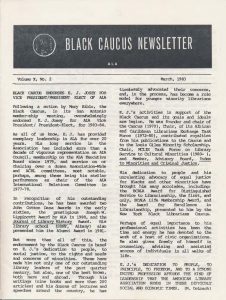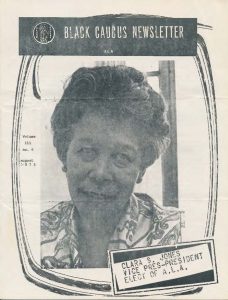February is African American history month and we at the ALA Archives want to help you optimize your research into African American and African history. In this month’s blog post, we’ll take a tour through ALA Archives holdings and we’ll use multiple strategies for finding information.
Read on to learn more about locating African American history materials at an archives!
Search by Subject
For keyword searches, the ALA Archives database can be searched to find related record series based on subjects. Similar to a library catalog, an archivist personally identified multiple subjects which are evidenced in an archives’ record series. Different from some library catalogs, some archives databases use subject headings primarily based on the archives’ holdings–rather than using a national subject heading system. Also, when using subject searches, careful researchers should be sure to use old subject terms, in case the local archives has not updated all subject keywords yet. Of course, we will use the ALA Archives as an example.
In the images above, we see the first screen of the subject keyword directory and we see that each subject is listed alphabetically. When researching African American history, one possible subject term is “African American”. So, we click the letter “A” to view the subject keywords which begin with the letter “A”.
Next, we look for the term “African American”. There we see “African-American” and “Afro-American”. The good news gets better, when we see that there are archives materials about Africa and Afro-American Studies!
Research tip: Instead of searching for a complete term like “African American”, searching by a stem word like “African” will include include multiple similar terms (and misspelled words or variants of words).
Bonus research tip: Instead of searching for a complete word, a search for a partial word like “Afr” would include other variants like “Afro-American”. If we searched for “African”, then we might have missed the subject “Afro-American” which is related to our interests today.
Now that we can locate some subject keywords manually, a few more useful ALA Archives subject keywords include:
African-American Studies Librarians Section, Black Caucus, Black History, and Black Librarians
As an example, if we click “African-American Studies Librarians Section”, then we find multiple record series related to the organization. From there, we can read the read the database record entries for more information.
Search by Keyword
Typically, advanced archival subject searches include specific names of people, places, or events, to identify as many useful record series as possible. Let’s use a prominent library history example: Mr. E. J. Josey. During his career, Mr. Josey served in multiple positions in the A.L.A. Therefore, if our subject search begins with Mr. Josey, then we’ll be exploring records of African American history (and other subjects too) as we locate any records which are related to his career. Unfortunately, researchers first need background knowledge of their topic to identify specific names of people, places, or events. Fortunately, the archivist is a resource and general database queries can help too.
Research tip: When researchers do not have any specific keywords, a general keyword search can help provide a starting point during exploratory research.
Bonus research tip: For specific queries, don’t forget that a word search of Record Series descriptions can be entered or a word search of Record Series folder titles can be performed too.
By the time you reach this section of the blog post, you should be able to locate a subject keyword to find record series which may contain the information that you seek. If that is not working, then this is a great chance to remember to always consult your local expert–the archivist!
Search by Archivist
If you ask me about African American history at the ALA Archives, then I would answer “let’s think about who wrote that topic and we can start there”. This is because the person (or group) who made (or saved) a document is probably the same person (or group) who donated the document (and we keep donations together as we file documents). Would another example help?
E. J. Josey was A.L.A. President (1984-85) and Black Caucus Chair (1970-71). A.L.A. offices would have documents received from him. After retiring, Mr. Josey could donate his presidential papers to A.L.A. Archives as a single Record Series. However, administrative Black Caucus documents were kept by the Black Caucus because they still needed those active records. At a later date, Black Caucus would donate their records which include some items written or co-written by Mr. Josey.
While, sometimes, we have the personal papers of a person; often, we have the administrative records or publications of an office. So just because we don’t have the personal papers of one librarian does not mean that we don’t have other records of their career or life.
Search by Record Series
African-American Studies Librarians Section (formerly Black Studies Discussion Group)
If you are looking for information about African American studies at the library, then why not also look into the information professionals who organize and provide access to African American studies at your library? The ALA Archives is fortunate to have the newsletters, subject files, meeting minutes, and committee files of the African American Studies Librarians Section of the Association of College and Research Librarians (ACRL).
Research tip: When researchers are not sure where to find information, then newsletters and other general publications of an organization are a great place to begin searching for topics because information is presented in readable narratives designed for general audiences.
Record Series 22/25/10, the African-American Studies Librarian Section (AFAS) Newsletter, contains newsletters beginning with the 1990s. The AFAS Newsletters include summaries of meetings, and announcements for events including conferences, deaths, news, prominent publications, and resolutions. Researchers searching for topics or themes should consult publications like the AFAS Newsletter to quickly survey many significant people, places, and events. Once a topic or keyword is located, then researchers should review subject files.
Research tip: When researchers generally know specific subjects of interest, then a subject file is a natural place to consult to find information on a given query. Subject files can contain a wide variety of documents about any given topic.
Record Series 22/25/26, the AFAS Subject File contains annual conference and midwinter meeting files, correspondence, newsletter policies, and select publications. Researchers should always consult a relevant subject file during and after their search. Solely browsing the folder titles and descriptions of a subject file helps familiarize researchers with which subjects were significant enough to warrant for the donor to keep. Often, subject files are rich with unsorted materials or single items that were not typically filed with other records. After exhausting a subject file, then researchers should check meeting minutes agenda and transcriptions for discussions of topics.
Research tip: Researchers consulting a subject file should allot extra research time for any unusual items and other exciting findings filed in the archives.
Research tip: Meeting minutes agenda and transcriptions are helpful information resources for specific information. Not all meeting minutes are perfectly transcribed or easy to read. Therefore, researchers search meeting minutes more efficiently after exhausting all external sources of information on a topic before reading meeting notes.
Record Series 22/25/1, the AFAS Minutes contain meeting minutes and agenda during the 1990s. Meeting minutes and agenda include member contact information and news about member projects. This particular record series is particularly helpful for understanding how African-American Studies Librarians have prioritized professional projects regarding African-American studies. For example, in 2000, AFAS considered participating in a Library of Congress project to suggest, revise, and create new subject headings relating to African American experience. The results and comments of a membership survey are included in the meeting minutes. Information like this can help some researchers understand how professional African American studies librarians have prioritized needs of African American studies researchers. Given the size of some organizations, additional meeting minutes and subordinate committee files may be useful to researchers searching for specific information not available in general administrative meeting notes.
Research tip: Sometimes, an archives may have meeting minutes of multiple different organizations which should not be overlooked. While some committees may seem similar to outsiders, careful researchers know that each committee and each meeting has a different purpose. Different information can be found in different meeting minutes and it is worth cross-checking.
Black Caucus of the A.L.A. (BCALA)
Speaking of publications, another great resource is the Black Caucus of the A.L.A. and its publication the Black Caucus Newsletter Record Series 56/40/10. The Black Caucus Newsletter includes committee reports, committee schedules, conference information, Black Caucus constitution adoption (1976), institute programs, Black Caucus meeting proceedings, grant opportunities, news, notable librarian announcements, job vacancies, professional development opportunities, and publication announcements.
Other Librarians Supporting Black Librarianship and African American Studies
Sanford Berman
Yet another great resource is the Sanford Berman Papers. Mr. Berman has been active in advocating for Black librarians and Black librarianship, and these communications are documented in his rich, extensive correspondence which are available to researchers. As of February 2017, there are over 30 folders of correspondence regarding African and African American issues. Some correspondents and topics include: African Liberation Movements (1972-73), the African Studies Association and Africana Libraries Newsletter (1972-76 & 1986), Black Americana for African Libraries (1969), Booklist and Children’s Books from Africa (1977), Omolara Leslie (1973), Liberation Struggle in Southern Africa: a Bibliography (review) (1973), Preliminary Bibliography on Women in Africa (1974), Radical Africana (1973-74), Paul M. Smith, Jr. (1973-75), Southern Africa Resource Center (1989-91), Edward I. Steinhardt (1972-73), the African Activist Association at UCLA (1972-73), South African Book Embargo Controversy (1989-93), African Books in Print (1972-76), Africana Library Journal (1970-74) and more.
James Danky
Still another great resource is the James Danky Papers. Mr. Danky has been active in advocating for the collection and study of print culture including alternative and small press publications. For African American history, Mr. Danky’s papers include the Afro-American Newspaper Archives and Research Center, (1987, 1989-90), Sherry Dupree and Afro-American Pentacostalism (1983-85), a Ford Foundation grant application for African-American Newspapers (1989), and the Afro-American Newspaper Project (1991-2001) and more.
Search by Archivist (Again and Often!)
As the name suggests, researching is searching and re-searching again, which implies that all of the above research strategies could (and should) be enjoyed multiple times for a given research project. Of course, be sure to check-in with your archivist during different stages of your research. Not only will the archivist alert you to new or incoming materials, the archivist has a great amount of experience searching the archives. Your archivist should be an irreplaceable resource for your own archival research.
A.L.A. Archives Blog Posts
The A.L.A. Archives has a growing cache of African American and African librarian and library history too. While providing access to A.L.A. history, these blog posts are rich with citations to other materials too.
“Action, Not Reaction: Integrating the Library Profession” by Denise Rayman, describes the history of integrating Black librarians into the profession.
“Clara S. Jones: ‘Awareness is Not Burdened with Repression, It Is Liberating” by Cara Bertram, describes the professional career of former ALA President Clara S. Jones.
“Publications: The Black Caucus Newsletter” by Salvatore De Sando, describes the early editorial history of the Black Caucus Newsletter.
“First Your Country, Then Your Rights: African American Soldiers in WWI” by Sharon Pietryka, describes the experiences of African American solders and their families during World War One through documentation found in the A.L.A. Archives.
Thinking like an Archivist
However, if you are not necessarily researching African American library history, then we have other resources and suggestions too. Your research into the archives is limited only by your imagination (and the hours of the archives).
The first example which comes to mind is our recent acquisition of the Dr. Gail Ann Schlachter papers. Dr. Schlachter (A.L.A. Executive Board member) researched and published multiple editions of financial aid directories for African American students, since the 1980s. The correspondence regarding research and publication of Financial Aid for African Americans, as well as the history of the publication or publisher, may also be valuable for research and understanding.
Another example (and research strategy) is to think about how the A.L.A. Archives materials may document different parts of African American history. For example, the A.L.A. was a leader in the national book donation drive and service for U.S. soldiers during both World Wars. There are at least three different World War One photograph slides prominently featuring African American soldiers.
We hope that the many uses and reuses of all materials at the A.L.A. Archives inspires some ideas and we look forward to your visit soon.
References
[1] Additional information resources on African American history at the University of Illinois Archives, including a sub-section which identifies even more ALA Archives holdings, is available too. Please see “Guide to African-American Research Resources“, University of Illinois at Urbana-Champaign Universy Archives, compiled by John Straw, edited by Ellen Swain and Chris Prom.
